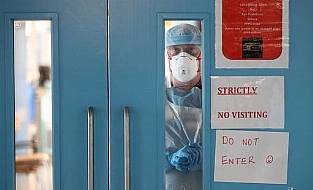A leading cardiologist has warned that Covid-19 should serve as an eye-opener to Irish people to improve their own general health and well-being.
Professor Carl Vaughan, Consultant Cardiologist at Advanced Medical Services, believes that the experience of this pandemic should act as a catalyst for people struggling with obesity and underlying health conditions to start acting proactively to ensure they are prepared to combat the next viral pandemic.
According to Professor Vaughan, the optimistic outlook for the medium and long-term should not distract from the opportunity that exists for people to take stock of their own health and well-being in advance of other pandemics that may arise in the future.
“This disease has had a significant impact on our society, and we have learned a lot of hard lessons,” he said. “Thankfully, we now appear to be turning a corner thanks to the vaccination programme, so in that respect there is a real cause for optimism. Now is a time for reflection and an opportunity to take stock of the fact that the virus had a disproportionate impact on people with underlying health conditions.”
Severe impact
Prof Vaughan said the impact of Covid has been particularly severe for people with heart conditions, underlying lung disease and those who suffer with obesity.
“Obesity has been a growing problem in Ireland for almost 50 years, and I believe that this pandemic should serve as a catalyst for people to take action. Globalisation and travel patterns will expedite the next pandemic, and I don’t believe we will be waiting 100 years for this to happen again.”
Working with Advanced Medical Services in Cork, Prof Vaughan has helped develop a programme which identifies people who are likely to be at future risk of significant cardiovascular disease and help them to address those risks pre-emptively.
Ed Donovan, chief Executive of Advanced Medical Services, said: “The programme that we have developed with Professor Vaughan helps to measure key metrics in our patients. We look at a person’s blood sugar, their cholesterol and their blood pressure. We monitor physical fitness and help people to optimise their BMI. If there is to be a take-home message from this pandemic, it is that our population needs to be healthier so that we are better equipped to deal with viruses that have a seriously debilitating or life-threatening impact on our lives.”
Although medics have been aware of Covid-19 since January 2020, the natural history and long-term outlook of the disease remains uncertain.
Long Covid
Prof Vaughan believes that the true extent of long Covid is unlikely to be fully understood for a number of years.
“The reality is that we don’t know just how ‘long’ the long-term effects will go on for. In the UK at the moment, hospitals are setting up special multidisciplinary clinics which are looking specifically at the aftereffects of the disease.”
The existence of a long-term post-viral syndrome is not something that should come as a surprise.
“When you look at glandular fever for example, a patient might pick up that infection at the age of 18 and he or she could suffer with chronic fatigue for up to two years afterwards.”
“We know that people who acquire an acute viral disease can have a sequelae that can go on for a very long period of time. Long-Covid, in my opinion, will prove to be a collection of disorders ranging from chronic fatigue to poor concentration and memory. Some people may suffer from deconditioning in terms of their ability to perform athletic feats.”
Prof Vaughan added: “One of the more concerning potential aftereffects is myocarditis in younger patients, which is a viral inflammation of the heart muscle. This can cause chest pains, palpitations and tachycardia, and it is something that we have seen.
“Thankfully it is not common and earlier studies suggesting that it is common have been refuted more recently. Another disorder that has come to attention recently is the presentation of young subjects with accelerated heart rate and palpitations."







